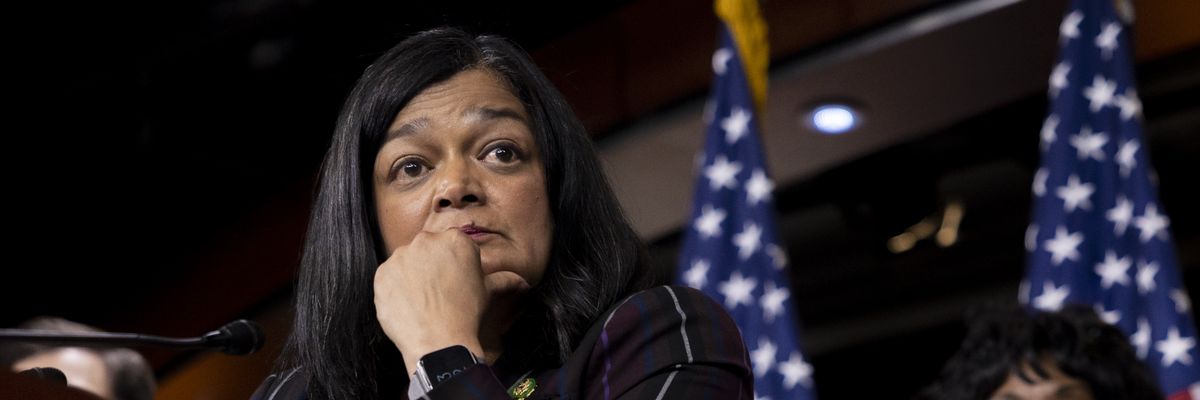Jayapal Says White House Should ‘Worry’ About Progressive Caucus Support for Debt Ceiling Deal

“I’m not happy with some of the things I’m hearing about,” the Washington Democrat said, stressing that still needs to see legislative text.
Rep. Pramila Jayapal said Sunday that the Biden White House should be concerned about securing the Congressional Progressive Caucus’ support for the newly announced debt ceiling agreement, given that the deal includes work requirements for aid programs and other provisions sure to infuriate the Democratic Party’s left flank.
Jayapal (D-Wash.), the chair of the Congressional Progressive Caucus (CPC), toldCNN she is “not happy with some of the things” she’s hearing about the tentative agreement but emphasized that she still needs to see legislative text, which is expected to be released Sunday afternoon.
Asked whether the White House and Democratic leaders still have to worry about whether the CPC—which has 101 members in the House—will support the final agreement, Jayapal responded, “Yes, they have to worry.”
While noting that the spending cuts in the deal aren’t nearly as large as the House GOP wanted, Jayapal raised concerns about the new work requirements for some recipients of Supplemental Nutrition Assistance Program (SNAP) benefits.
The White House-GOP agreement would reportedly impose work requirements on adult SNAP recipients who are up to 54 years old and have no children—up from the current age ceiling of 49. Under current law, as the Center on Budget and Policy Priorities explains, “non-elderly adults without children in their homes can receive benefits for only three months every three years, unless they are working at least 20 hours a week or can document they are unable to work.”
The broadening of work requirements would sunset in 2030, according to the White House, and SNAP eligibility would be expanded for veterans and people who are homeless.
Jayapal said Sunday that SNAP work requirements are “absolutely terrible policy,” adding that “we have seen reams of data that show that, when you put these work requirements in, they’re really just administrative red tape that prevent the people who need help from getting help.”
“I told the president that directly when he called me last week on Wednesday that this is saying to poor people and people who are in need that we don’t trust them,” Jayapal said, noting that people on SNAP receive an average of $6 per day in benefits. “I think it is really unfortunate that the president opened the door to this.”
Outside advocates and economists have vocally condemned the debt ceiling agreement’s real-term spending cuts, attacks on aid programs such as SNAP and Temporary Assistance for Needy Families (TANF), and cuts to IRS funding, but progressive lawmakers have been largely quiet since details of the tentative deal began emerging Saturday night.
House Minority Leader Hakeem Jeffries (D-N.Y.) wrote in a “Dear Colleague” letter on Sunday that Republicans will release legislative text at some point in the afternoon and top Biden administration officials will brief the Democratic caucus on the deal at 5:00 pm ET.
Politicoreported Sunday that “Democrats are pissed that Republicans got a briefing on the deal last night—and that they won’t get the same until 5:00 pm tonight.”
One unnamed senior Democrat told Politico that rank-and-file lawmakers are “furious that they will learn about [the details of the deal] from Republicans and Sunday talk shows.”
Some members of the far-right House Freedom Caucus, meanwhile, have responded angrily to the tentative agreement, which would lift the debt ceiling until January 1, 2025 and put spending caps in place for 2024 and 2025.
Rep. Ralph Norman (R-S.C.) called the deal “insanity,” complaining that it wouldn’t cut spending aggressively enough.
During a press briefing Sunday morning, House Speaker Kevin McCarthy (R-Calif.) downplayed the Freedom Caucus outrage, saying he’s confident that a majority of House Republicans will vote for the agreement.
The Treasury Department warned Friday that the U.S. government will run out of money to pay its obligations on June 5 unless Congress lifts the debt ceiling.




